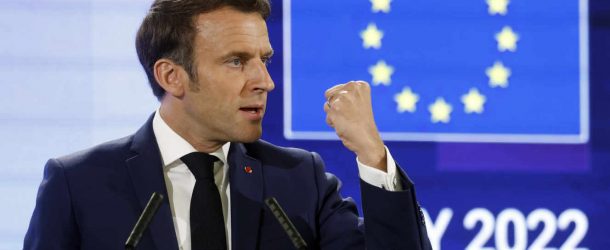Introduction
The way forward is clear: strengthen Turkey’s position within Europe, re-invigorate accession negotiations with the EU and steer Turkey away from ideas such as membership of the Shanghai Cooperation Organization.
The European Political Community is the brainchild of French President Emmanuel Macron. Macron first presented the European Political Community project to the European Parliament in May, saying that it would allow democratic countries to find a new space for cooperation on political issues that concern everyone. This project for a platform for political dialogue and cooperation, which was put on the agenda at the EU Leaders’ Summit in June, has also been endorsed by the EU leadership.
German Chancellor Olaf Scholz expressed his support for the European Political Community project, saying that issues of concern to the European continent, such as security, energy, climate and economics, will be regularly discussed.
What is the aim of the project?
The project aims to involve countries that are not part of the EU in political decision-making processes. Didier Billion sees this project as the result of Macron’s failed ambition to “make the European Union work again“: “Macron, who presented himself as the most important person in Europe, as the one who believes in the EU the most, did not do what he thought in his first term in office. But he started from the right conclusion: the EU is not working well. That’s why he invented the European Political Community project, because he thought that with 27, 28 or in the medium term more states, the EU could not continue to function as it did 10 or 15 years ago.“
The idea of Multilateral Europe basically envisages a central core of 3 to 6 countries, which does not act according to the principles of unanimity and majority, and which prepares industrial, economic, military, and political projects. And it will include other states that are not directly linked to this central core, such as EU countries and non-member states such as Turkey. These states will be linked to the European dynamic but will not have all the rights and responsibilities.
Ukraine and Moldova, which received the green light from the EU after Russia’s invasion of Ukraine, were granted candidate status in June. Macron had said at the time that Ukraine’s EU candidacy could turn into membership after a years-long process and that countries like Ukraine, which share the same values with the EU, could unite under the umbrella of the “European Political Community” instead of becoming a member.
EU officials describe the European Political Community as an “inclusive process” for both the EU and third countries. They emphasize that it is not a replacement for EU enlargement or policies. Macron presents the community from a completely different angle. He argues that a European Political Community could improve political relations between candidate countries and the EU. According to him, the Community could be the right answer to “enlargement fatigue” after a long candidacy process.
We are in a period in which international balances, institutions and organizations are rapidly changing. With the departure of the United Kingdom from the European Union (EU), a new search has begun in the European balance. The EU seemed to have suspended its expansion plans for a while in order to deter new tendencies of separation or differentiation that might emerge within the EU. Aside from the fact that there were still countries in the Balkans waiting for membership, Turkey was of course the biggest candidate at the door. It would not be an exaggeration to think that the EU’s difficulty in absorbing a big candidate country like Turkey played as much a role as Brexit in slowing down enlargement and emphasizing internal deepening and integration.
Russia’s military aggression against Ukraine has created the need to update this approach. In EU circles, the need for the rapid integration of Ukraine, Moldova, and Georgia into the EU began to be voiced. Turkey was again not mentioned. However, there were also those within the EU who believed that the accession of these three countries would not be easy. Since the territories of these three countries were partly under the control of Russia, it was impossible to argue that they had their own territorial integrity and their admission as members would bring the EU and Russia into confrontation. Creative thinking was therefore needed. This is one of the reasons, perhaps the most important one, why the idea of a “European Political Community” (EPC) was put forward.
Conclusion
The countries invited to the October 6 meeting in Prague are countries within Europe, each with different characteristics and different relations with the EU. For example, Iceland, Norway, Liechtenstein, and Switzerland are members of the European Free Trade Association (EFTA). Switzerland has separate arrangements with the EU, while the other three EFTA members are part of the European Economic Area together with EU members. In the Balkans, Serbia and Montenegro have advanced in their accession negotiations with the EU. Albania and North Macedonia are about to start accession negotiations. Bosnia and Herzegovina and Kosovo have not yet been declared EU candidates. The status of Ukraine, Moldova, and Georgia, which is the real issue, is well known. This path will be opened wide when our country becomes a social state of law based on democratic values, fundamental rights and freedoms, human rights and the separation of powers. Without this, concepts such as the European Political Community or the strategic partnership will be useless.
Of course, the two countries in the most different positions are the UK and Turkey. The UK is a country that has just left the EU. It is not clear what it would aim to achieve by joining the proposed EPC in preparation for EU membership. At this stage, it is difficult to see how Turkey would benefit from being part of the EPC, eventhough it is argued that it would not be an alternative to our EU membership candidacy and thus to our membership negotiations.
Didem ŞİMŞEK
REFERENCES

























































